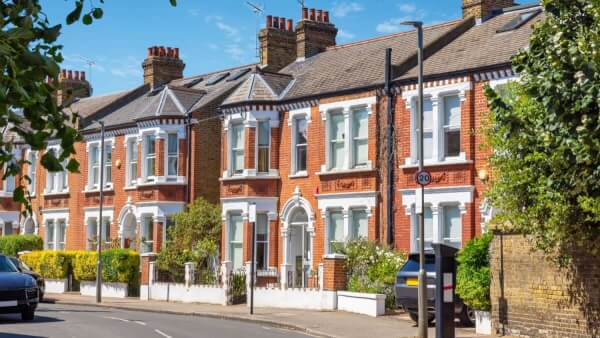Buying property in Canada as a foreigner
Read our comprehensive UK guide to buying property in Canada as a foreigner, including average prices, fees, taxes and where to start house hunting.

Thinking of moving to Ireland from the UK, and want to buy a home? Perhaps you’re already living there in rental accommodation, and are thinking of taking your first steps on the property ladder.
Whatever your plans, we’re here to help. Read on for a comprehensive guide to getting a mortgage in Ireland from the UK, with info for both residents and non-residents.
We’ll run through how easy/difficult the process is for UK nationals, what documents you’ll need, the fees involved, current mortgage rates in Ireland, and some Irish banks and lenders to check out.
Also, if you’re looking for ways to save money on currency exchange when sending a down payment or mortgage fees to Ireland, check out the money services provider Wise. You can send large transfers with Wise for low fees* and great mid-market exchange rates - making it ideal if you’re sending a secure international transfer.
It’s far easier to get a mortgage in Ireland if you’ve moved there, whether it’s to work, retire, study or start a business. It’s much more difficult if you’re not already living in Ireland, but not impossible.
Some Irish banks and lenders offer what is known as ‘non resident mortgages’. Although these are hard to find (partly because the Irish mortgage market is smaller than the UK) and difficult to successfully apply for.¹
You’ll have a better chance if you have a high income (paid in EUR ideally) and a large deposit, and if you have a provable connection to Ireland.¹
Still, you might need to do quite a bit of research beforehand, contacting numerous lenders to find out what they can offer and their requirements.
Otherwise, you may need to find alternative ways to finance the purchase, or wait until you’ve moved to Ireland to apply for a mortgage.
As Ireland is part of the EU and the UK has now left, you might be wondering whether there will be any impact on how easy or difficult it is for UK citizens to get a mortgage in Ireland.
The good news is that Brexit has made little to no difference to the process. This is because the UK and Ireland are both part of the Common Travel Area. This means that citizens from either country can live or work in the other without needing a visa or residence permit.¹
This means that if you’re a UK national living in Ireland, you’ll have the same rights to apply for a mortgage as an Irish citizen.
However, as we’ve mentioned, you may struggle to get a mortgage there if you’re still living permanently in the UK.
The criteria for mortgage applications will vary between lenders.
But generally speaking, you may need to meet the following requirements to apply for a non-resident mortgage in Ireland as a UK national:¹
The eligibility threshold for residents of Ireland is likely to be much lower, making it easier to get a mortgage if you’re living there.
If you meet the criteria, getting a mortgage in Ireland can be relatively straightforward.
Be prepared for plenty of paperwork though, along with lots of checks and detailed questions about your income and spending habits.
However, there are some challenges that can make it more difficult.
For example, you might not be able to get a mortgage if:
And for non-residents, the process is more complicated, with more requirements and higher thresholds for acceptance. You might need to show more documentation, or be asked for extra information - which can slow down the process.
There may also be the complication of your documents being in another language, where they need to be translated and certified.
To give you an idea of what to expect, here’s a step-by-step look at the process of applying for an Irish mortgage as a foreign national:
Once this is done, you can get on with buying your property in Ireland.
| 💡 Read more: Taking cash in or out of the UK: What are the rules? |
|---|
The exact documents you’ll need to apply for a mortgage in Ireland as a non-resident will vary between lenders.
But here’s an idea of what you’re likely to need:³
Getting your approval in principle or AIP from a mortgage lender will usually only take around 10 days.
But it can take a few months to get your final mortgage offer and complete on the mortgage. The exact time it takes varies on a case-by-case basis.⁴

Applying for a mortgage in Ireland usually involves a few different fees. The main ones to know about are arrangement fees and valuation fees.
Also known as the product fee or completion fee, it’s the main fee for taking out the mortgage.
It’s charged on completion, and varies by lender, mortgage product and the size of the loan. Some lenders don’t charge any arrangement fees.
If the mortgage company needs to carry out a valuation of the property, they may charge a valuation fee of around €200 to €300.⁵
It’s important to note that this valuation survey only looks at the value of the property, and won’t identify any structural, maintenance or other issues. You’ll need to commission your own building survey for that.
You may also encounter some of these other costs when applying for a mortgage in Ireland:
If you’re a legal resident of Ireland and you’ve been there for a sufficient amount of time, you should have access to the same mortgage products as Irish citizens. This means you can choose from all of the country’s banks and lenders which offer mortgages.
But your choice will be much more limited if you’re still living in the UK and are looking for a non-resident mortgage.
One option to try is Permanent TSB. One of Ireland’s major banks, it offers Buy-to-Let mortgages to non-residents.⁶ You’ll need to contact the bank to find out whether it can offer you a residential mortgage if you’re not living in Ireland, and what the requirements are.
Ultimately though, the decision about who is eligible for a mortgage or home loan is made by the institution. It’s worth contacting them for a chat about which products might suit you - or enlist a broker to help.
| 💡 Read more: How to transfer large sums of money between bank accounts? |
|---|
As of May 2024, the average mortgage rate in Ireland was 4.17%, with first-time buyers able to get fixed rates under 4% from major banks such as PTSB and Bank of Ireland.⁷
Remember though that mortgage rates fluctuate regularly - so you’ll need to check the updated rates when you’re ready to apply for your mortgage.
The rate you’re offered will also depend on your circumstances and eligibility, the amount you’re borrowing and how much of a deposit you have.
It may be possible to get a mortgage in the UK to finance your property purchase over in Ireland. But not all UK banks and lenders offer what are often known as ‘overseas mortgages’, so you’ll need to do some shopping around.
You could also look at remortgaging an existing property you own in the UK, borrowing more to raise funds for your purchase in Ireland. Crucially, you should only do this if you can afford the repayments, and it could be a good idea to seek professional financial advice.
Yes, a number of banks offer Buy-to-Let mortgages in Ireland. These are mortgages designed specifically for buying Irish property as an investment, which you intend to rent out to tenants.
One example is Permanent TSB, which offers Buy-to-Let mortgages to non-residents looking to invest in Irish property.⁶ However, you might find that Buy-to-Let mortgages in Ireland for non-residents tend to have higher interest rates.
It’s also possible to remortgage your property in Ireland. You may want to do this to get a new mortgage once a fixed-term mortgage has ended, or to get better interest rates once you’ve built up equity in your home.
Remortgaging can also help you borrow more money, such as to fund another property purchase without having to sell your first property.
You’ll just need to make sure you can afford the repayments and aren’t overstretching yourself.

There are a few different mortgage types available in Ireland, and it’s important to choose the right one for your circumstances.
The main types to know about are - fixed-rate mortgages, variable rate mortgages and green mortgages. There are also buy-to-let mortgages, which we’ve already covered above.
Additionally, there are different ways to repay, including capital repayment and interest-only options.
A fixed-rate mortgage has a fixed interest rate for a set period, which in Ireland is usually 2, 5 or 10 years. This means you’ll know exactly how much you’re repaying each month.
Once the fixed term ends, you’ll usually be moved onto a variable interest rate. At this point though, you can choose to remortgage - either with the same lender or an alternative.
This type of mortgage has a variable interest rate, which is linked to ECB (European Central Bank) interest rates. With variable rate mortgages, your monthly payments may rise or fall.
A relatively new kind of mortgage in Ireland, a green mortgage offers discounts for applicants buying or self-building energy efficient homes which meet a Building Energy Rating (BER) of B3 or above.⁴
There are also mortgages which vary based on the way you make repayments. Capital repayment is where you pay the amount you’ve borrowed plus interest, while interest-only is where you just pay off the interest.
| 💡 Read more: The best UK banks for sending money abroad |
|---|
To stand the best chance of getting accepted for an Irish mortgage as a non-resident, bear these tips in mind:
If you’re sending your deposit and mortgage fees to Ireland from the UK, you may incur hefty transfer and exchange fees when converting your British pounds to euros (EUR). This is where Wise and the Wise account can help you save money.
Open a Wise account online and you can start managing your money in 40+ currencies (including GBP and EUR). It’s not a bank account but offers many similar features.
Here’s an overview of the main benefits for using Wise: |
|---|
|
Sources used:
Sources last checked on date: 05-Sep-2024
*Please see terms of use and product availability for your region or visit Wise fees and pricing for the most up to date pricing and fee information.
This publication is provided for general information purposes and does not constitute legal, tax or other professional advice from Wise Payments Limited or its subsidiaries and its affiliates, and it is not intended as a substitute for obtaining advice from a financial advisor or any other professional.
We make no representations, warranties or guarantees, whether expressed or implied, that the content in the publication is accurate, complete or up to date.

Read our comprehensive UK guide to buying property in Canada as a foreigner, including average prices, fees, taxes and where to start house hunting.

Read our comprehensive UK guide to buying property in Indonesia as a foreigner, including average prices, fees, taxes and where to start house hunting.

Read our comprehensive guide for non-residents selling UK property, including fees, taxes and timescales.

Read our comprehensive guide to selling property in the US, including fees, taxes, timescales and a step-by-step guide to the process.

Read our comprehensive guide to selling property in Switzerland, including fees, taxes, timescales and a step-by-step guide to the process.

Read our comprehensive guide to selling property in Portugal, including fees, taxes, timescales and a step-by-step guide to the process.